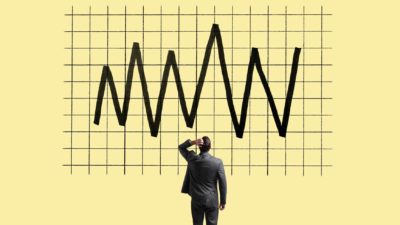It's just before 9am as I sit down to write this.
We woke up to news that the US markets, and the S&P 500 index in particular, fell 12% overnight.
The ASX will open in just over an hour.
By the time you read this, it may well be trading.
It won't be pretty.
Today's falls come on the back of three weeks of stock market declines.
[Edit: Here's me, at 10.15am, updating all of the above to let you know that after the worst day in 30 years in the US, the ASX has opened strongly positive. Again, though, by the time you read this it may have changed. Such is life on the ASX in March 2020!]
I'll be honest — while I have no interest in the 'record', 'worst since' and 'points fall' headlines, I can't remember a time when the market fell so far, so fast.
So, in a way, this is unprecedented.
So is the health crisis we're facing.
No, I'm not a doom-and-gloomer. Nor am I someone who likes to catastrophise (I may have just invented a word) situations.
It's unlikely to kill a greater proportion of the population than wars or previous flu outbreaks.
It's unprecedented in the sense that we have a larger global population than ever before, more (and faster) international transportation, and a media- and social media landscape that lives for clicks, provides instant access to global news, and is never turned off.
I don't, for a second, want to downplay the health crisis. It truly is a crisis, and our health authorities, regulators and governments are scrambling to find the right solutions.
But it's worth reflecting on all of that, when thinking about investing. Think about the motivations (and fears) of people who trade stocks for a living. Think about whether they were investing in 2008/9. Or in 2000. I wonder if they remember the '87 crash.
Ask yourself:
"If the stock market is the sum total of all of the earnings for all of the listed companies, from now until eternity… (and it is)… will the total of those earnings really be 30% lower than people expected only three weeks ago?"
No, not this month's earnings.
No, not this year's earnings.
Not even next year's earnings.
The sum total of every dollar earned, by every company, from here to eternity.
(And yes, the 'time value of money' says that today's earnings are worth more than 2030 earnings, because I should pay less if I don't get that cash for a decade. But even then?)
Because, if that's true — if the sum total of the cash generated by ASX-listed companies really will be permanently 30% lower — then shares are fairly priced, today.
But if it's false?
If profits really will take a dive this year, and maybe even next year, but they'll recover over time, and be down, in total, by less than 30%?
Then you're being offered a discount.
And that, in plain black and white, is the question for investors.
But maybe share prices keep falling!
Yes, but maybe they don't.
But this crisis has a long way to play out!
It does. But that doesn't mean share prices will (necessarily) follow.
They could, of course. I have no predictive powers. Nor does anyone else.
But look at it this way.
Even if the current 30% fall was fair (and I think it's probably overdone), would further falls really be justified?
Let me put that another way:
There's probably been some damage to the economy already. But the worst is yet to come.
So why are shares down 30%?
Because the market is already anticipating much of the bad news.
Stock markets might be inefficient, in part, most of the time, but investors know that their job is to look forward.
So, as the news rolls on, traders and investors are making their bets on how bad the future will be, by buying and selling when they think that's prudent.
Which is why economies and stock markets tend not to move in time.
After all, the ASX gained 25% (including dividends) last year, when our economy grew very moderately.
Or, to paraphrase my boss: "There's a difference between 'peak panic' on the market and 'peak virus' in the community"
Feel like we're on a war footing?
Here's something I found yesterday, written 6 years ago:
"Germany invaded Poland on Sept. 1, 1939, launching WWII in Europe. At first, the Dow didn't react much. Many people expected the U.S. to stay out. But when Hitler invaded France in May 1940, the market got hammered (1). Over an eight-day period, it fell 23%. It rallied after that, but the worst was yet to come.
The market was already in a serious decline, which had begun in the summer of 1941, when the Japanese attacked Pearl Harbor on Sunday, Dec. 7 (2).
The Dow fell 3% on Dec. 8 and another 3% the next day. The Dow hit 92.69, its lowest level since 1934, on April 28, 1942.
Then the market turned. There seems to have been no single event that triggered it.
…
That was the beginning of a bull market that carried the Dow up 130% in four years."
No, we can't just assume history will repeat.
But it does tend to rhyme.
I'm not — for a second — assuming this is the bottom. I have no idea.
And maybe the market wasn't that high before the War.
Maybe there were different conditions at play then.
Maybe.
Maybe you're thinking 'But we've given up much of the post-GFC gain'.
Two thoughts:
First, you're listening to the wrong people, who never factor in dividends, which make up 40% of ASX returns.
Second, even if that was true (it's not), we're at a low point now. It doesn't matter whether we're up, down or sideways from some arbitrary point in the past. What matters is what happens from here, over the long term.
You can compare us to the 2007 high (or the 2020 high) if you want.
But we're not there. We're here.
Buying 30% below the 2007 high was a stupendously good idea, even if the market continued to fall for a while.
By now, either you're nodding furiously, or you have your arms crossed, and you're reading almost in protest.
I don't expect this little missive to sway everybody.
I wish it did. But it won't.
I'm going to finish here.
Partly, because it saves me having to again edit this piece to reflect whatever the market has done in the last 15 minutes.
But mostly, because I've made my case.
To summarise: No-one knows the future. Not the bulls, not the bears. Not the optimists or the pessimists, the 'she'll be right'ers' or the 'we'll all be rooned' mob.
Last week, our paid services released 11 buys and 1 sell.
We'll release more Buy recommendations this week.
I intend to buy this week (our trading rules may prevent it — members always go first).
Not because I know we're at, or even close to, the bottom.
But because the share prices look attractive, relative to long-term earnings potential.
Which, as I said at the top, is what matters.
Remember: in the short term, schools might close for a while. Businesses might close for a while, too. (Some will go broke, unfortunately). In the long term, life will go back to normal, and the companies that don't go broke will get back to normal.
My bet is that we'll look back on this month as a great time to buy shares.
Waiting for the absolute bottom? Here's the bad news: you'll only be able to tell with the benefit of a few months' of hindsight. By which time, it'll probably be too late; the opportunity will have passed.
Focus on the long term, Fools.
Financially, anything else is a distraction.
Fool on!








